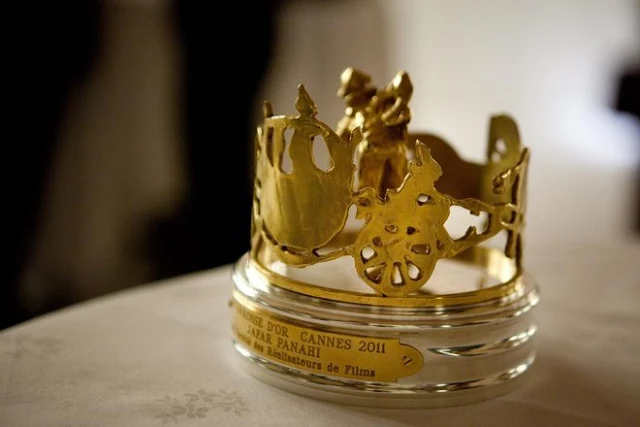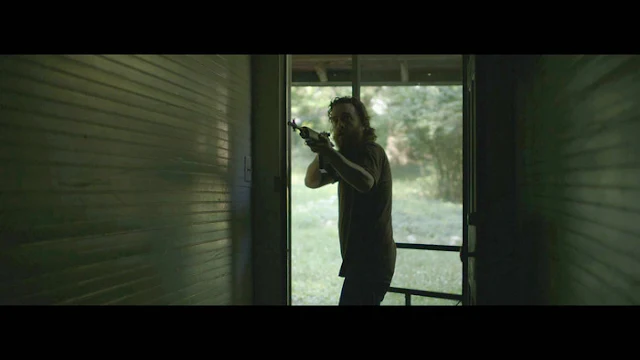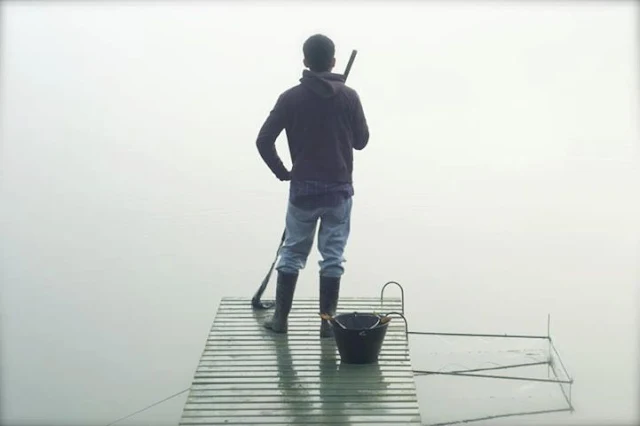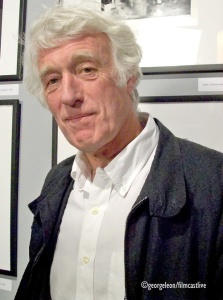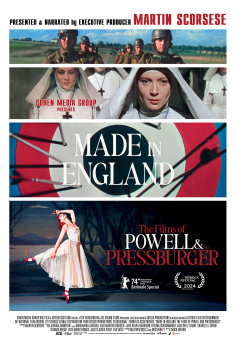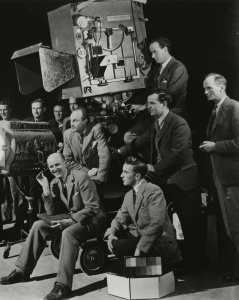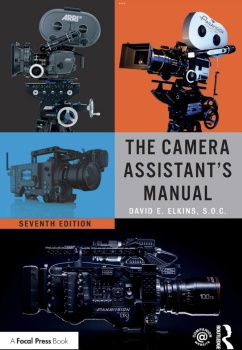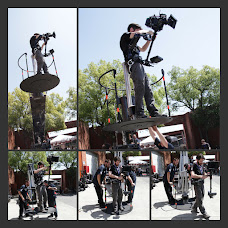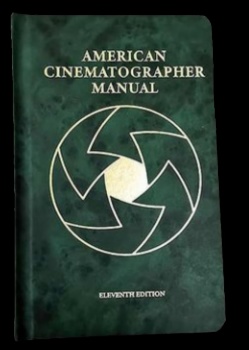by George Leon
Created by the French Director's Guild in the wake of the events of May ’68, the Directors’ Fortnight seeks to help filmmakers contributing to their discovery by the critics and audiences alike. From its initial program in 1969, it have created a breeding ground where Cannes Film Festival goers would regularly find its future prestigious auteurs.
To encourage the recognition of young filmmakers, the Caméra d’Or was created in 1978 and it is awarded to the Best First Film shown either in the Official Selection (Competition or Un Certain Regard), the Directors’ Fortnight or International Critics’ Week. The Caméra d’Or is presented at the Festival’s closing ceremony on Sunday, May 26 by the president of the 2013 jury,
Agnes Varda.
Director Michael Rowe takes the coveted Camera d' Or Award for Leap Year
at the 63rd Festival de Cannes
The Carrosse d’Or (Golden Coach) Prize is a tribute by directors of the
SRF (
Société des Réalisateurs de Films) to one of their own, chosen from the international filmmaking community for the innovative qualities, courage and independent-mindedness of his or her work. Since its creation in 2002, this prize has been given to Jacques Rozier, Clint Eastwood, Nanni Moretti, Sembene Ousmane, David Cronenberg, Alain Cavalier, Jim Jarmusch and Naomie Kawasé, Agnès Varda, Jafar Panahi, and Nuri Bilge Ceylan in 2012.
The prize was presented during the Directors’ Fortnight, which runs alongside the Cannes Film Festival and is a tribute by directors chosen from the international filmmaking community for innovation and courage. The
Carrosse d'Or is a bronze statuette inspired by the figures of the Comedia dell'Arte and Jean Renoir's film of the same name – it was created by painter-sculptor Lili Legouvello.

Jane Campion
was acknowledged last week by her peers
receiving the prestigious Carrosse
d’Or'
"Needle”, from U.S. film student Anahita Ghazvinizadeh, has nabbed the top prize at Cannes’ Cinefondation, whose jury was presided by Jane Campion. Ghazvinizadeh, a student at the School of the Art Insitute of Chicago, won €15,000. As the First Prize winner, Ghazvinizadeh will have the opportunity to present her feature debut at the Festival. “Needle” is a coming-of-age drama centering on a young girl who is going to get her ears pierced but a quarrel between her parents overwhelms the situation.
In 1998, the Festival de Cannes created the
Cinéfondation to inspire and support the next generation of international filmmakers. Since then, with the help of the Festival, the Cinéfondation has developed complementary programs to help achieve its goal.
Some of the feature films selected for Director's Fortnight 2013.
Blue Ruin. Directed by Jeremy Saulnier
Hours after it made its world premiere in Directors’ Fortnight at Cannes, the Jeremy Saulnier-directed Blue Ruin was acquired by Radius-TWC. A revenge drama, Saulnier’s film centers on a homeless man (Macon Blair) who sets out to kill the person who murdered his parents but winds up starting an unfortunate chain reaction instead. Unlike most revenge thrillers, the movie offers a revenge kill 20 minutes in before setting down its true narrative path, making it a study in the price of justice as much as a vendetta narrative.
El Verano de los Peces Voladores The Summer of Flying Fish. Directed by Marcela Said
In “The Summer of Flying Fish,” Chilean docu director Marcela Said makes a subtle shift into scripted drama, shaping scenes of tension between white landowners and the local Mapuche natives so as to seem unrehearsed. Said’s technique blends flashes of melodrama with such naturalistic choices as shooting on location and working mostly with non-actors, resulting in a challenging fiction/nonfiction hybrid that’s stylistically neither fish nor fowl. From a festival programmer’s perspective, “Summer” is a dream offering: a refined, politically conscious film by a female director that reveals a seldom-seen social dynamic. In commercial spheres, however, it should be a much harder sell.
Jodorowsky's Dune. Directed by Frank Pavich
The story of an enormously influential film that was never made. That may sound strange on a number of levels: How does one of the most famous collapsed productions in cinema history, a failure so dire that it derailed its director’s career for many years, become a source of inspiration? Especially when the resulting documentary largely consists of a man in his 80s sitting around and talking? Well, when the old guy talking is as brilliant, passionate, ferocious and hilarious as Jodorowsky, and when the stories he tells convince you that his quixotic dream of making an enormous science-fiction spectacle that combined star power, cutting-edge technology, philosophical depth and spiritual prophecy nearly came true, it’s as if you glimpse his vision of a transformed world where everything is possible. The rain-sodden crowd of movie buffs who packed into the Théâtre Croisette here on Saturday night for the premiere of “Jodorowsky’s Dune” rode with the film for every second; there were several outbreaks of spontaneous applause and a standing ovation for director Pavich when it was over.

La Danza de la Realidad. The Dance of Reality. Directed by Alejandro Jodorowsky
The Guardian (UK) film critic Peter Bradshaw called La Danza de la Realidad (“The Dance Of Reality”), Chilean cinematic trickster Alejandro Jodorowsky’s first film in 23 years, “a triumphant return, which mixes autobiography, politics, torture and fantasy to exuberant, moving effect.” The extinct volcano of underground cinema has burst into life once again — with a bizarre, chaotic and startling film; there are some longueurs and gimmicks, but The Dance of Reality is an unexpectedly touching and personal work. At the age of 84, and over 20 years since his last movie, Alejandro Jodorowsky has returned to his hometown of Tocopilla in the Chilean desert to create a kind of magic-realist memoir of his father, Jaime Jodorowsky, a fierce Communist whose anger at the world — at his son — was redoubled by the anti-Semitism the family faced. The film is oddly moving for what it conceals, or accidentally reveals: the director's very real, understandable emotions of pain and regret on the subject of his father, and how these emotions are being managed and contained with surrealist mythologising. In this movie, the director is bidding farewell to his past, and to his childhood, and perhaps to the world. It is an arresting spectacle.

Les Apaches. Directed by Thierry de Peretti
Inspired by real events, director Thierry de Peretti probes the ugly underbelly of his native Corsica. The theft of an antique double-barrelled shotgun has unexpectedly deadly consequences in this moody French drama, but any resemblance to Guy Ritchie’s knockabout comedy thrillers ends there. Loosely based on real events, Apaches takes place at the southern tip of the Mediterranean island of Corsica, birthplace of the film’s director and co-writer Thierry de Peretti. Playing in the Directors Fortnight strand in Cannes, this quietly engrossing tale of crime and punishment should earn further festival mileage, but the downbeat plot and cast of young unknowns suggests that luring foreign distributors will be an uphill struggle.
Les Garçons et Guillaume, à table. Me Myself and Mum. Directed by Guillaume Gallienne
here’s no point of accusing actor-director Guillaume Gallienne of making an exhibition of himself. That’s the entire point of Me Myself And Mum (Les Garçons et Guillaume, à table!), a cheerful and inventive comic confessional about Gallienne’s upbringing, his relations with his mother, and his eventual embracing of his inner heterosexual after growing up as a female-identified boy whom everyone assumes is gay. Based on Galienne’s successful solo stage show, the film plays up its theatrical origins only to transcend them in sometimes dizzily flamboyant coups de cinéma, with Gallienne playing a genial master (and sometimes mistress) of ceremonies throughout.
The Congress. Directed by Ari Folman
"A genius designer on an acid trip" is the way one character describes the futuristic animated universe of Ari Folman's "The Congress," which contains one of the most startling uses of the medium to come along in years. Words can hardly do justice to the plethora of outlandish visuals populating this ambitious sophomore feature from the Israeli director of "Waltz With Bashir," but they're merely one piece of a larger puzzle. Folman's beguiling project amounts to a stinging indictment of mainstream culture's unending commodification. The director spent half a decade assembling his loose adaptation of Stanislaw Lem's science-fiction novel, "The Futurological Congress," and the work shows in both its stunning appearance and the extraordinary depth of insight paired with it. Folman uses beauty and wonder as vessels for rage. That's an idea to set tongues wagging at the Cannes Film Festival, and it's the distinct impression left by Israeli director Ari Folman's head-spinning part-animated feature "The Congress." Fittingly, Cannes provided the inspiration for the director's dystopian vision of the entertainment business, which stars actress Robin Wright as, well, actress Robin Wright - a 40something performer whose career is on the slide.

The Last Days on Mars. Directed by Ruairí Robinson
Resourcefully designed and shot on striking Jordan desert locations that stand in for a dust-choked Red Planet, The Last Days on Mars is an atmospheric chiller that unleashes zombie peril in space. Far more sober than that premise suggests, the unapologetically derivative sci-fi outing doesn’t have the scripting muscle to deliver on its early promise. But the solid cast keeps it reasonably gripping nonetheless. Its ambition alone will make this a useful calling card for Los Angeles-based Irish filmmaker Ruairi Robinson. he establishing scenes are terrific, with cinematographer Robbie Ryan prowling the barren landscape in hazy light, and the visual effects team whipping up truly menacing dust storms accompanied by Max Richter’s score, by turns melodic, moody and urgent. There’s also a potent sense of the claustrophobia of people stationed in a remote outpost, tinged with notes of dread.

The Selfish Giant. Directed by Clio Barnard
"13 year old Arbor and his best friend Swifty, both excluded from school
and outsiders in their own neighbourhood, meet Kitten, a local
scrapdealer and begin collecting scrap metal for him using a horse and cart.
Swifty has a natural gift with horses while Arbor emulates Kitten -
keen to impress him and make some money. But when Kitten begins to
favour Swifty, leaving Arbor hurt and excluded, a wedge is driven
between the boys. Arbor becomes increasingly greedy and exploitative,
increasing the tension between them, and leading to a tragic event which
transforms them all". The audience for The Selfish Giant, rose to its feet and applauded wildly for the entire duration of the closing credits, which is true. But as one of the folks clapping like mad, I can tell you that it was less about the film than about the stunned smiles on the faces of its two non-professional teenage stars. Britain has found a new director to be proud of, said the Times. Loosely based on the children’s story of the same title by Oscar Wilde, it’s the first narrative feature by England’s Clio Barnard, who made a splash a couple of years back with her superb experimental documentary The Arbor.

Tip Top. Directed by Serge Bozon
Based on a crime thriller by British novelist Bill James – is a topsy-turvy sex comedy tarted up as cop drama. It's silly and wacky and rude and glib. A Punch and Judy show playing out on the set of Silent Witness.
Isabelle Huppert and Sandrine Kiberlain play Esther Lafarge and Sally Marinelli, two internal affairs investigators parachuted into the police department in Villeneuve, Lille to uncover the mole who caused the death of an Algerian informant. They're joined by the snitch's handler, Inspector Mendes (François Damiens) - who's keen to shift the focus of the investigation from his shady dealings with his new shill (Aymen Saïdi) towards his chances of hopping in the sack with one or both women. Rapidly hurtling down its comic slope infused with slapstickcomedy, Tip Top is a refreshing movie and undeniable proof of the multifaceted talent of Serge Bozon, a filmmaker who knows how to choose genres and blend them into all sorts of hypotheses.
Un Voyageur. Ain't Misbehavin. Directed by Marcel Ophuls
Ophuls returns to the Croisette for the first time in almost two decades with new documentary Ain’t Misbehavin (Un Voyageur), a cheerful and bittersweet journey through cinema history. 25 years ago the director’s acclaimed documentary Hotel Terminus, about Gestapo chief Klaus Barbie, picked up the festival’s FIPRESCI Prize en route to the Oscar for Best Documentary. Ophuls’ new film is altogether lighter in tone, spanning his childhood in Berlin and Paris and adolescence in Hollywood as the son of legendary director Max Ophüls. It then tracks his life and career as the award-winning maker of documentary classics including The Sorrow and the Pity and the aforementioned Hotel Terminus. Ophuls talks with and about legendary personalities including Jeanne Moreau, Bertold Brecht, Otto Preminger, Ernst Lubitsch, Woody Allen, Stanley Kubrick and his friend François Truffaut with his memories interspersed with film clips.
We Are What We Are. Directed by Jim Mickle
The American remake of Jorge Michel Grau’s 2010 Directors’ Fortnight selection Somos Lo Que Hay. Ambyr Childers and Julia Garner star in Mickle’s version as sisters forced to take on their family’s gruesome tradition after their mother’s death. Pic debuts in the same sidebar where the original first caught producer Andrew D. Corkin’s eye three years ago. Corkin’s Uncorked Productions optioned US remake rights with Rodrigo Bellott, took it to Memento Films’ Nick Shumaker, and tapped Jim Mickle (Stake Land) to co-write and direct. Linda Moran from Belladonna Productions and Jack Turner rounded out the producing team. Mickle describes his version as a “call and response” companion piece to the Mexican original, which told a different version of the cannibalistic family tale.
Swimmer (A short). Directed by Lynne Ramsay
Seeing that the wait time between films can be a lengthy one, We Need to Talk About Kevin director would be in the middle of lensing Jane Got a Gun, but since dropping out she took on jury duty for the Main Comp and is showing perhaps the most anticipated short film on the Croisette this year.The 16 minute short film, enters the mind of an endurance swimmer on a journey through Britain’s waterways, using sound and images to penetrate his thoughts, feelings, dreams, nightmares, memories, escape.
Quinzaine des Réalisateurs
Cinéfondation



